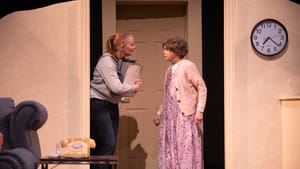Stay in the Loop
BSR publishes on a weekly schedule, with an email newsletter every Wednesday and Thursday morning. There’s no paywall, and subscribing is always free.
The long goodbye
Isis Productions presents Marsha Norman’s ’Night, Mother

Isis Productions closed a pandemic chapter by finally bringing ’Night, Mother to the stage. The company eked out a single preview performance in March 2020 at Christ Church Neighborhood House before falling victim to the first Covid-19 lockdown. Almost exactly two years later, its production of Marsha Norman’s frank exploration of sorrow and suicide is fully realized.
Was it worth the wait? Yes and no. Under Neill Hartley’s direction, this assumption benefits from committed performances and the vestiges of residual shock that still infuse this play nearly 40 years after its premiere. At the same time, Norman’s script is beginning to show its age. As the culture has accepted more forthright dramatizations of mental health in crisis, there is an element of ’Night, Mother that now seems positively quaint—almost cloyingly so.
As a result, the play now feels very much a product of its time—a fact that bumps up against Norman’s stern direction that the play’s time “is the present.” The material comes across best when placed in the context of its creation. Audiences in 1982, when it debuted at the American Repertory Theatre in Cambridge, Massachusetts, were shocked when mild-mannered, middle-aged Jessie Cates (here played by Kirsten Quinn) announces her intention to end her life at the top of the show. Could she possibly be serious?
Unsettling clarity
The remainder of the play, which unfolds in real-time on a banal Saturday night in the country, involves Jessie preparing her mother, Thelma (Renée Richman-Weisband) for her impending departure. She instructs her on the garbage pickup and the milkman’s schedule. She fills candy jars and unpacks a case of her mother’s beloved Sno Balls. She offers to give her a manicure. All the while, her late father’s gun haunts the scene, stashed in a shoebox on the kitchen table of Damon Gelb’s drably tidy set.
The unsettling clarity that Jessie brings to her choice still rattles. Norman presents her as a woman unfairly treated by the world—her husband gone, her son a criminal, her worsening epilepsy leaving her unable to work—who has made what she judges to be a logical decision. She approaches the situation with a fair amount of gallows humor, and although she clearly cares deeply for her mother, the affection is not enough to keep her there.
Yet the structure of the script, which focuses on the mundane business leading up to the act, now takes on an almost cartoonish element. Norman seeks to embed revelations in casual conversation, but those points come across less strongly than they have in the past. At times, it can feel like a play about housework.
Tension and serenity
Matters aren’t helped by Hartley’s stagnant direction. The 80 minutes that elapse between Jessie’s confession and her death should speed past while still feeling somewhat suspended in time. Here, they simply plod. Individual moments in the production need a greater sense of tension—the audience should be aware, for example, when Thelma finally accepts that she cannot change her daughter’s course. Any such understanding here comes from the acting, not the direction.
The performances do make the evening worthwhile. Richman-Weisband infuses Thelma with vulnerability and grit, and you sense that she’s dancing as fast as she can to change the inevitable outcome. Quinn presents Jessie’s journey with a becalmed resignation that approaches serenity as she moves toward her final moments. It’s unsettling, as it’s meant to be.
As a depiction of a serious, sensitive topic, ’Night, Mother may have outlived its moment. But Isis Productions can be congratulated for coming back to life after a long, dark intermission.
Know before you go: ’Night, Mother includes discussions and depictions of suicide, mental illness, and epilepsy that may be uncomfortable to some viewers.
What, When, Where
’Night, Mother. By Marsha Norman. Directed by Neill Hartley. $15-$25. Through March 27, 2022, at Christ Church Neighborhood House, 20 N. American Street, Philadelphia. (609) 220-7537 or isisperforms.com.
Proof of Covid-19 vaccination is required to attend. Masks are optional. Seating is not distanced.
Accessibility
Christ Church Neighborhood House is an ADA-compliant venue. There is an elevator to the fourth floor, where the theater space is located, and wheelchair seating is available upon request.
Sign up for our newsletter
All of the week's new articles, all in one place. Sign up for the free weekly BSR newsletters, and don't miss a conversation.

 Cameron Kelsall
Cameron Kelsall